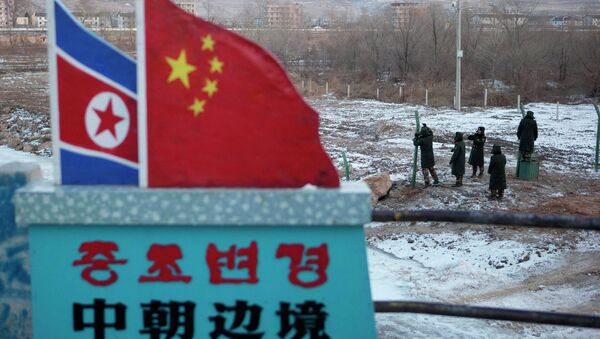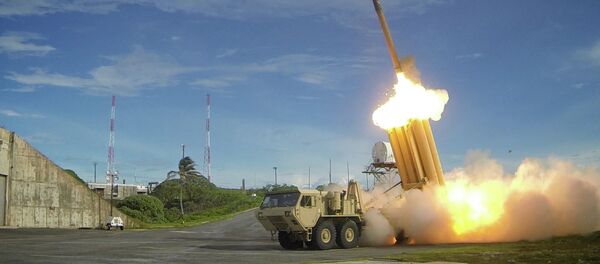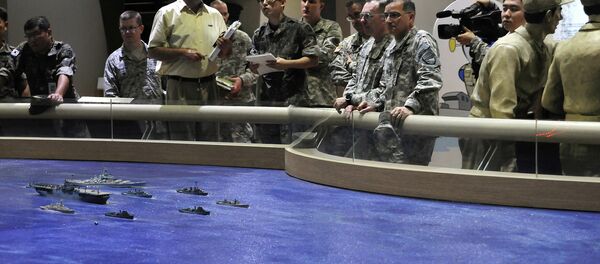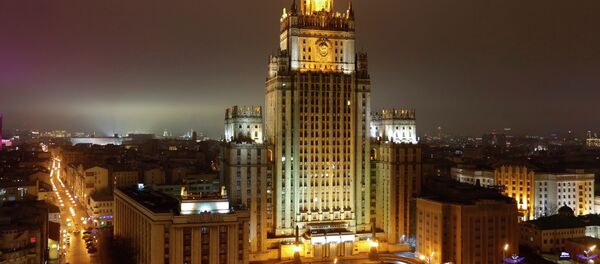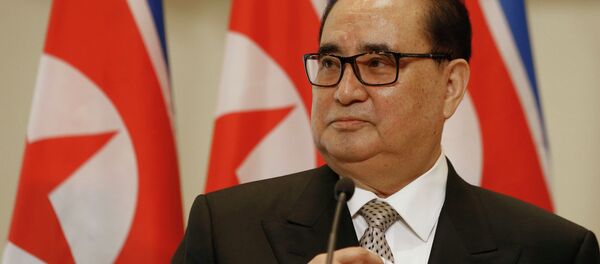Citing the much-discussed Russian invitation of Kim Jong-un to Moscow for this year's Victory Day celebrations in May, Ding noted that the North Korean press has been very active recently in playing up the warming of relations between Moscow and Pyongyang. The expert added that press statements about Kim's successes in the international arena, together with growing recollections of his grandfather Kim Il Sung's visit to Moscow and the countries of the Eastern Bloc in the 1980s, are signs that the leader is planning to go through with the planned visit.
The expert noted that the improvement of relations with Russia have been Pyongyang's only major foreign policy success in a large-scale, multi-vector diplomatic initiative launched last year aimed at improving relations with the outside world following the cooling of relations with China. Ding states that amid the crisis in Ukraine, for which Russia has been blamed by Western nations, Russia too has shown a growing interest toward improving relations with North Korea.
Ding believes that last year's November visit to Moscow by senior North Korean politician Choe Ryong-hae "signified the beginning of the 'honeymoon'" in relations between Russia and the DPRK. He notes that following this visit, Russia invited Kim Jong-un to the Victory Day celebrations, and talks on economic and security cooperation have deepened and intensified.
Ding is not incorrect in his estimations. In January, North Korean officials held economic talks with their Russian counterparts on expanding economic cooperation. Rumors have circulated about possible multibillion dollar projects aimed at rebuilding and revitalizing North Korea's electricity transmission infrastructure, modeled on the large-scale railway infrastructure modernization projects being carried out with Russia's help since 2008. North Korean officials have also shown interest in purchasing excess electricity from the regions of Russia's Far East. It was reported last month that Russia's RAO Energy System East has plans to supply energy to North Korea beginning as early as next year.
Moreover, Russia has also showed signs of interest in hiring North Korean workers for its ambitious economic development projects in the Russian Far East, and in the purchase of North Korean rare earth minerals in exchange for assistance on North Korea's infrastructure development projects. Last year officials even discussed the possibility of establishing a visa-free regime between the two countries.
In the area of potential military cooperation, much was made last month of Russian Armed Forces Chief of Staff Valery Gerasimov's comments that the Russian military had entered into preliminary negotiations on the potential for joint military exercises with countries including North Korea, Cuba, Vietnam and Brazil.
Citing improved relations between Russia and the DPRK on the diplomatic, economic and military fronts, Ding argued that "Russia's influence in this situation is already too high," and, given that relations are only improving further, "questions arise about whether China-DPRK relations can return to the levels they were at previously, and whether Beijing will be able to strengthen its geopolitical influence over North Korea."
Russian-Korean-Chinese Diplomacy Is Not a Zero Sum Game
Despite the expert's ominous warnings, Russian officials and experts do not believe that improved relations with North Korea will in any way hinder the DPRK's historically close ties with China or in any way threaten stability in the region. Last year, following meetings with his North Korean counterparts, Alexander Galushka, Minister for Development of the Far East, noted that Russian-North Korean economic and trade cooperation depends to a great extent on political and military stability in the Korean Peninsula, adding that increased economic and trade cooperation with the DPRK would itself provide for the strengthening of such stability.
Dismissing the idea that there is anything extraordinary about the North Korean leader's presence in Moscow for Victory Day, Russian media have noted that Kim is to be one of more than two dozen world leaders set to attend the celebrations, with Russia having invited dozens more leaders, including South Korean President Park Geun-hye. While it is believed that Park will not attend due to pressure from Washington, Russia has long held the view that Koreans' documented history of heroic partisan resistance to Japanese militarism during the war entitled them participate in the victory celebrations. Moreover, Chinese President Xi Jinping himself is also set to be present, and the Chinese Foreign Ministry showed nothing but approval earlier this year for Kim's possible visit to Moscow, stating that "such engagement between the two countries is conducive to regional peace and stability."
